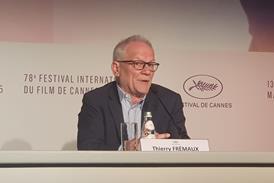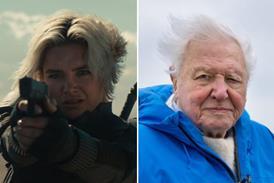Dir: Stanley Kwan.Chi-HK. 2005. 115mins.
With EverlastingRegret, Stanley Kwan delivers a women's film par excellence; the kind thatfilm-makers such as Douglas Sirk loved to spin out and that Kwan himself hassuccessfully proved adept at in the past.
A sprawling, melancholystory about unrequited love adapted from one of modern China's most successfulnovels, it follows Shanghai beauty Qiyao from the mid 1940s to the early 1980swhile turbulent political events play out in the background.
But one cannot escape thesense that too much has been lost in translation from book to screen;characters feel reduced, events are lightly sketched in and the two-hourrunning time feels inadequate at providing the full picture of either Qiyao'slife or the social earthshocks it is juxtaposed against.
A cast featuring major starssuch as Sammi Chang and Tony Leung Ka Fai, and the novel's reputation (whichmay explain Jackie Chan's presence on the production team) should help carry EverlastingRegret in Chinese-speaking territories, although its appeal will be limitedfor audiences who are less familiar with the book or its historical background.The film played in competition at Venice before travelling to Toronto.
Told through the eyes of aphotographer, Cheng (Tony Leung Ka Fai), who provides occasional narrativebridges throughout, the picture picks up the very young Qiyao (Sammi Chang) asshe accompanies her best friend Lili (Su Yan) down a Shanghai street during themid-1940s.
The two walk into Cheng'sstudio and the photographer, smitten by Qiyao's beauty, puts her picture inlocal papers and persuades her to enrol in a beauty contest. He is to becomeher ardent admirer for the rest of their lives, although always from adistance, as she moves from one man to another and from one historical periodto the next. Time has no visible impact on her and her appearance hardlychanges save through the impact of costumes or make-up.
The impetuous Qiyao abandonsa respectable pre-arranged marriage once she is crowned beauty queen andbecomes the mistress of officer Li (Hu Jun), a high-powered official of theNationalist regime. But Mao's communist revolution drives out the Nationalists- and Li.
Several years later, Qiyaofalls for Ming (Daniel Wu), the son of a rich industrialist, and evencontemplates marrying him. But again she is left on her own after his familylose all their property and leave for Hong Kong. Now pregnant and desperate toacquire a legitimate surrogate father, she pays the family of an ailing,sour-faced man to be her husband - but he soon dies.
By this stage Cheng's wifehas discovered his secret affection for Qiyao and left him, giving him theperfect opportunity to step in. But the Cultural Revolution erupts and he isdispatched to the countryside to help the rural population.
In 1976 he returns toShanghai, with a young, turbulent companion, Kela (Huang Jue), who becomes thenext and last object of Qiyao's affection, despite the fact that he is herdaughter's age.
Though the material seems torequire a vast historical canvas on which to unfold, Kwan prefers a veryintimate approach. He highlights each and every one of Qiyao's affair in moodpieces that never really supply a full picture of each one, but rather suggestemotional events that are insufficiently supported by the evidence.
Thus, the Li episode seemscloser to a gangster movie than the political upheaval it represents, while theMing segment never quite explains why Qiyao was left behind. And trying tofigure out the relationships between the different characters involved in theKela story can be pretty complicated at times.
Kwan's approach tobackground events also has some shortcomings. The Cultural Revolution ispresented too much as a happy romp in the countryside, and references to pastevents feel too carefully polite and pat to affect the lives of the characters (although word is that the China Film Bureau insisted on cuts before the film went to Venice).
Chang is undeniably lovelyto look at but her performance lacks passion and never really gets under theskin. Tony Leung Ka Fai has to work hard to make Cheng as passive a characteras the script wishes him to be. None of the other men in Qiyao's life haveenough of a chance to develop more than an attitude.
The passing of time is shownthrough the remarkable production design of William Chang Suk-ping. But thecamera rarely leaves the sets for the open air, a peculiar choice given therelevance of Shanghai as a city in this context.
Music is reminiscent of WongKar-wai's In Mood For Love, which adopted a similar approach to HongKong's past.
Production companies
Shanghai Film Studio
JCE Movies Limited
International sales
Golden Scene Company
Chief producer
Jackie Chan
Executive producers
Ren Zhonglun
Albert Yeung
Hu Jinjun
Qu Guanghui
Producers
Xu Pengle
Willie Chan
Chen Baoping
Feng Jun
Screenplay
Elmond Yeung based on the novel by Wang Anyi
Cinematography
Wang Lian
Editor
William Chang Suk-ping
Production design
William Chang Suk-Ping
Main cast
Sammi Chang
Tony Leung Ka Fai
Hu Jun
Daniel Wu
Hunag Jue
Su Yan





























No comments yet